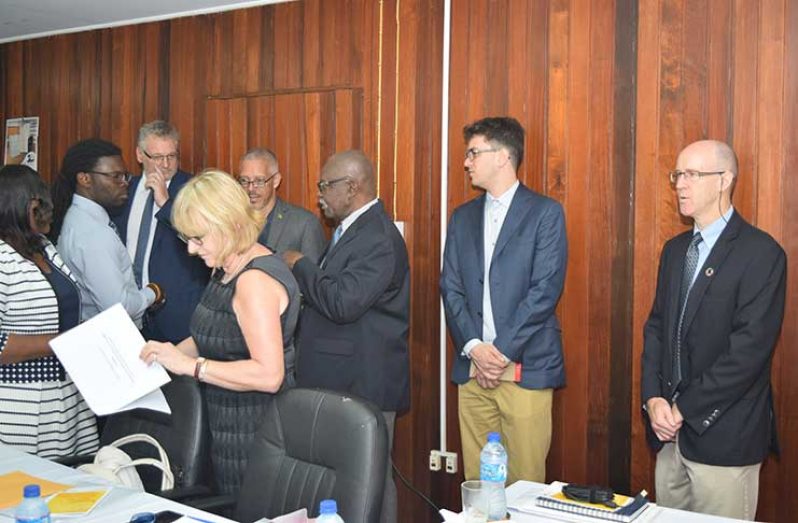— moves afoot to fix loopholes in immigration system
AFTER being compromised on many occasions, Guyana’s immigration system is set for change that will see it no longer “operating with naked rubber,” Citizenship and Immigration Minister, Winston Felix said.
The archaic system is set to get an upgrade with the European Union (EU) through the International Organisation of Migration (IOM), in partnering with the Government to harden “soft” parts of the immigration structure.
In June 2015, after taking office, the minister through the Department of Citizenship, applied to the IOM to be part of the African, Caribbean and Pacific (ACP) Human Migration Action Programme, which is funded by the EU.
According to the IOM website, since March 2015, the ACP-EU Migration Action Programme has received 15 technical assistance requests from 13 ACP Governments and two regional organisations.
The programme’s aim is to provide technical assistance for visa, counter trafficking, human smuggling, remittances and readmission, among others.
Subsequent to the application by Guyana, the IOM sent one of its consultants, Patricia Bell, who conducted her investigations into the country’s immigration system and later compiled a report, which was submitted to the minister.
After receiving the report and plan of action from the EU Ambassador to Guyana, Jernej Videtic, Minister Felix announced that this is the first step in Guyana’s move to bring “meaningful” change to its immigration system.
“With the current system, we are encountering foreigners, who present passports with bogus Guyana stamps… how long must we contend with a situation where our system is easily defrauded… It is our duty to make sure we protect it from fraud so that genuine travellers will be able to traverse without fear of using a visa,” the Citizenship Minister said.
A recent incident of this nature involved a Chinese national, who was charge on February 7, 2017 with defrauding an immigration officer and forging a Guyanese Business Visa and departure stamp in his passport.
The current system entails, for persons travelling from countries whose passport holders require a visa to enter Guyana, an application must be made to any of Guyana’s missions or consulates and visas will be issued on arrival.
Some of the countries which require a visa to enter Guyana are Bulgaria, Croatia, Cyprus, the Czech Republic, Estonia, Hungary, Latvia, Lithuania, Malta, Poland, Romania, Slovakia and Slovenia.
The recommendations and action plan derived by the IOM will not only benefit Guyana but help to create a simple and more transparent system for persons traveling to Guyana.
E-VISA
As outlined by the minister, part of the guidelines and recommendations that are in the report include the need for the establishment of an electronic visa and the enhancement of Guyana’s work (business) visa.
The visa will be electronic, meaning no label or stamp appears on the passport. But, the visa is accessible for viewing by airlines or, at a port, through an electronic system.
These visas were hallmarked as the source for correcting the “many issues” associated with Guyana’s current visa system.
“It will serve us well, given that they will ensure that persons entering Guyana for work are properly screened and vetted… and the recommendations will ensure that the policy is set straight for travellers and airlines,” Minister Felix said.
Business Minister, Dominic Gaskin and junior Public Health Minister, Dr. Karen Cummings also welcomed the plan, saying that it will positively benefit their ministries.
Although the e-visa is a major addition to the immigration system, Minister Felix outlined that it will take time to review and change all the immigration policies and implement the recommendations. As such, he said, hopefully, it will be fully introduced by 2020.
But in the interim, the Government with the assistance from the IOM will implement various aspects of the recommendations as they are reviewed and agreed upon by the stakeholders involved.
“We will indeed get it in line with international standards and only make changes when change becomes necessary,” said the minister.
Ambassador Videtic was optimistic about the plan-of-action to improve the system by improving the quality of visa document, immigration services on visa issuance and the visa’s reputation by bringing it up to international standards. He said with migration becoming one of the biggest challenges worldwide, there is much need for a migration system based on better organised, legal migration and well managed mobility of people. Also with a good migration policy, a country will limit or even eradicate the instances of human trafficking.
And with the new immigration system in the pipeline for Guyana, the economy, he said, will have a system which encourages tourism and foreign investment, because with the e-visa in particular, safety and security will be managed with an easily traceable system, which electronically monitors unregulated inflow of foreign citizens.












